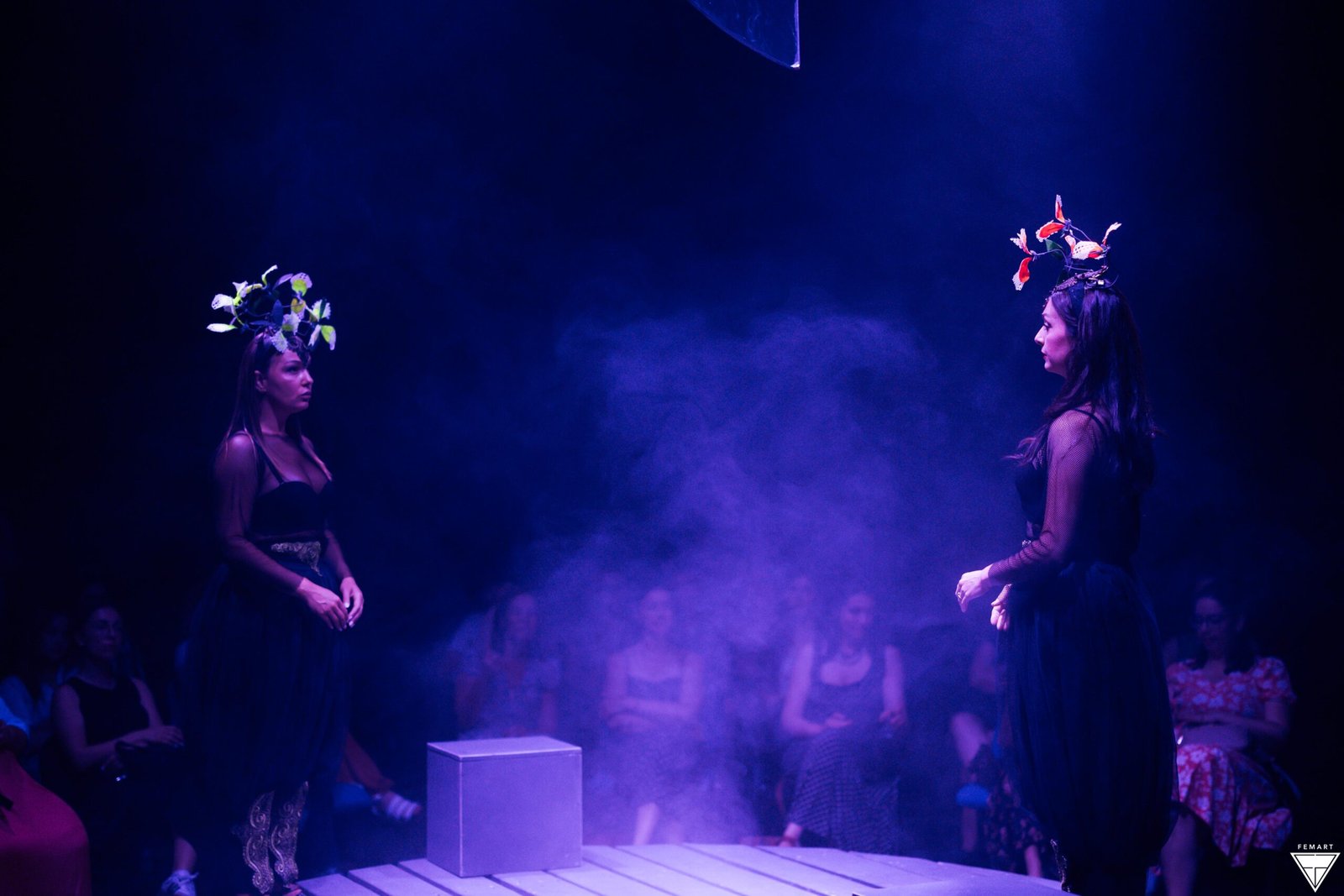By: Gili Hoxhaj
A knife-shaped object separates two women who live the same experience — but in different ways. The knife is larger than a human being. It has two blades — just like the dual realities of the characters. Everything feels restrictive. “I Am Her”, written by Diturie Neziraj and Valmira Thaqi, and directed by Erson Zymberi, brings two harsh worlds to a head on the fourth night of FemArt 13. A performance that makes the audience both laugh and cry — just like the two actresses, Tringa Hasani and Semira Latifi.
Both navigate a new reality, caught in a continuous transformation between sleep and wakefulness, as their babies cry — and with the noticeable absence of a father who never shows up.
A silver tray beneath the circular stage, surrounded by the audience, is filled with tea cups. The actresses serve them — but with tones of irritation. They fulfill the task, but they do not submit. They are fully aware that this is not the entirety of their role. And that is the success of this play: confronting reality, while also resisting it.
There is no monotony here. The simple stage design effectively visualizes their daily life within four walls.
“She gave birth.”
“Where’s the girl? Is there a boy too?”
“She has no milk.”
“You’ve just got poison in that bottle.”
“Don’t let the baby cry.”
“Let it cry.”
“Get up. Tears don’t raise a child.”
“We’ve done five or six already…”
These weren’t unfamiliar lines. Nobody was surprised. This reality hasn’t disappeared.
The golden trim of the dimija at the characters’ feet peeked from beneath black garments. Flowers adorned their heads. Both are new mothers — one gave birth naturally, the other via C-section. One has breast milk, the other does not. And both are criticized. Both are sleepless. Amid this chaos, each envies the other’s reality.
The only moments of glorification come through songs — familiar, especially during summer wedding seasons — composed by Tomor Kuçi. These are the same songs often found on TikTok, where smiling brides adorned in gold embrace their new role.
“Oh Ardita, sister of our brother, we celebrate for you.”
Only in song — for appearances. Everything else is critique. Two friends on stage voice the constant criticisms — different for each, but rooted in the same exhaustion. They measure the expectations placed upon them by others.
Tringa is louder, more defiant, cursing those who have made her life harder — including the father of her child, who disappeared and left her entirely alone. He didn’t even provide the child’s birth certificate so she could enroll them in public daycare. Tringa is the one who insists they return to life and to work — not just for herself, but for both of them.
Instead of love or support, they’ve received unsolicited opinions on how they should have made decisions for raising their children — how perhaps, “it would have been better otherwise.”
The play began as a conversation between two friends — Valmira and Diturie — stepping outside their creative egos to write and build something for everyone. So that each audience member might become part of the story and the performance.
“That energy and love followed us throughout the entire process of creating this play,” said Valmira.
“Because everyone carried an invisible weight of responsibility to give their best. This wasn’t just an artistic project”, she added.
At one point, the characters recall being at the beach, when their only concern was keeping the beer cold. Now, they clink the iron of the ironing board. Only this brings a small laugh — the shift from beer bottles to milk bottles. From party nights to sleepless, tear-filled ones.
One has a boy, the other a girl. They talk about the differences they’ve heard. In the end, they joke about marrying their children. One lives completely alone — her partner left and never returned, taking no responsibility. She breaks down in tears.
Near the end, they embrace — expressing a sense of solidarity, understanding, and the will to rise again.
This production — a collaboration between the Gjilan Theater and Bon Production — deeply moved the audience. It brought mothers back to familiar experiences and stirred empathy and solidarity — regardless of gender.
“I Am Her,” presented at the FemArt Festival, left me with a very strong feeling,” added playwright Valmira Thaqi.
“With a mixed-gender, multi-generational audience, I saw and felt — from the handshakes, from the tearful eyes of mothers and women who looked at us with admiration after the show. Last night, our story — our play — liberated minds and touched consciences for something we often don’t see or don’t fully understand: the invisible burden of postpartum depression”, said Valmira.
With scarves on their heads, they whisper once more the advice older women have passed down for generations.
And it all starts with “don’t”:
Don’t do this. Don’t do that.
And it makes you wonder — what kind of inheritance are we passing on to women in the name of tradition? What have we truly given to new mothers besides advice they never asked for?
This play confronts you with courage. It evokes guilt. It awakens.
We all carry a little piece of their pain, a bit of their loneliness, a fraction of their burden — and a deep desire for more understanding.
Even when pain is invisible, words can be sharper than knives — especially when the wound is still bleeding.
Let us not forget.

